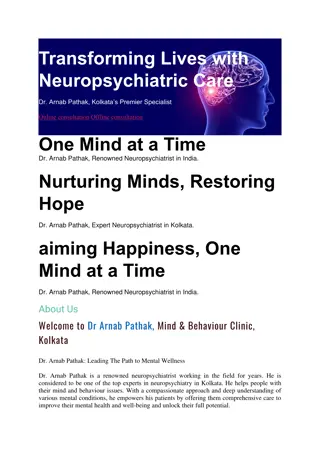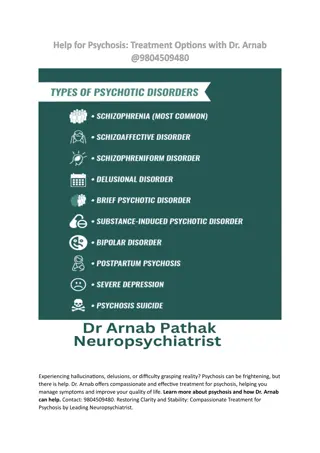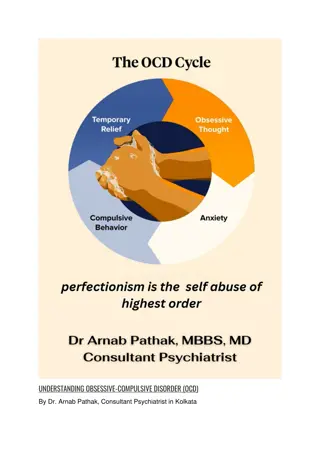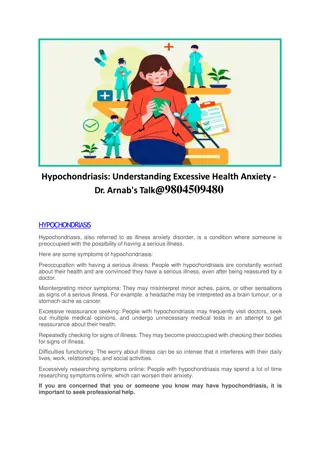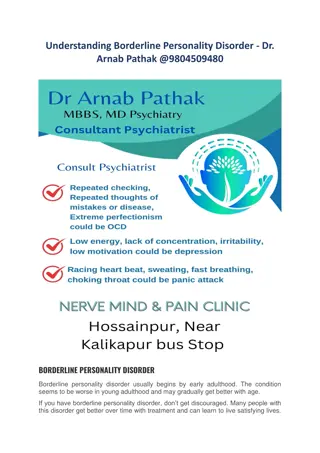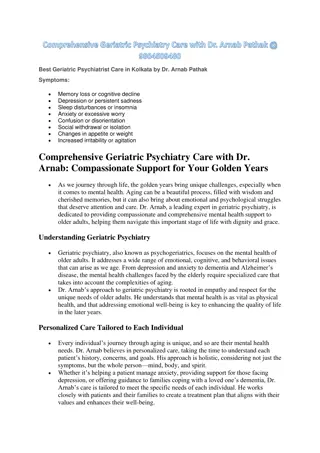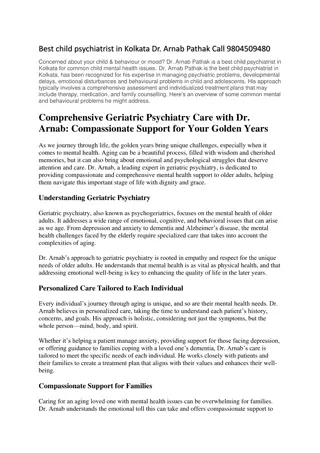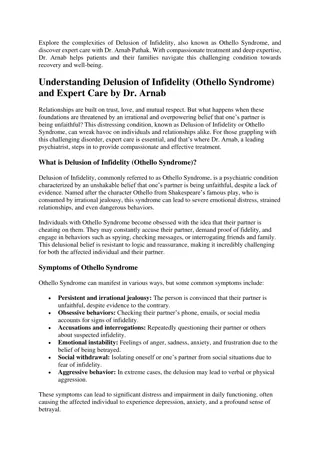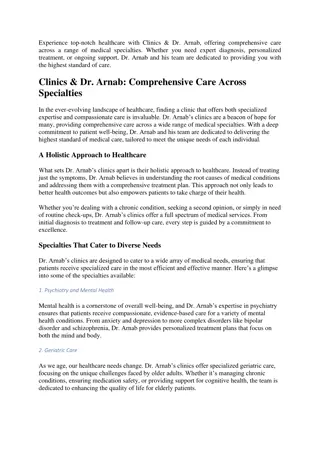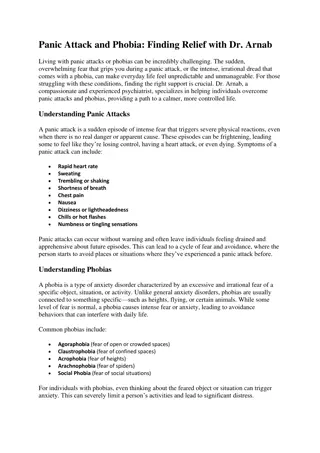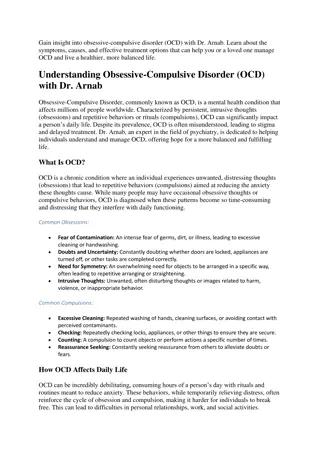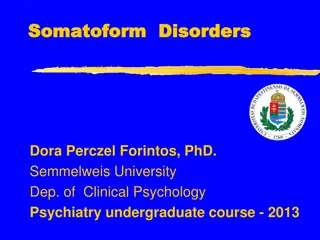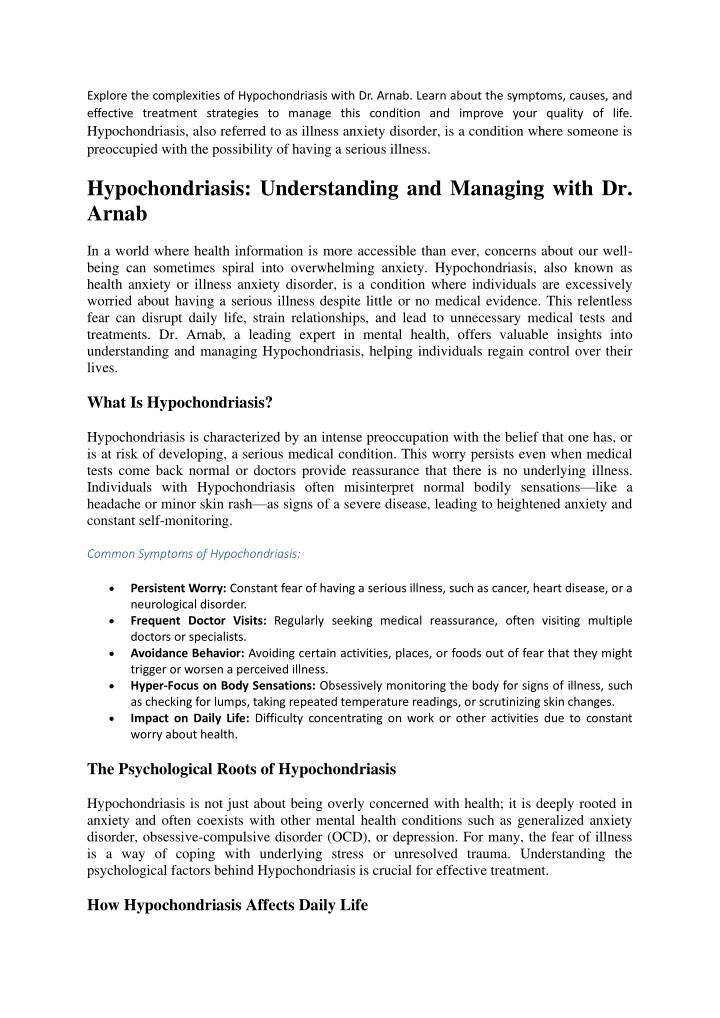
Hypochondriasis Understanding and managing with Dr Arnab
Explore the complexities of Hypochondriasis with Dr. Arnab. Learn about the symptoms, causes, and effective treatment strategies to manage this condition and improve your quality of life. Hypochondriasis, also referred to as illness anxiety disorder,
Download Presentation

Please find below an Image/Link to download the presentation.
The content on the website is provided AS IS for your information and personal use only. It may not be sold, licensed, or shared on other websites without obtaining consent from the author. If you encounter any issues during the download, it is possible that the publisher has removed the file from their server.
You are allowed to download the files provided on this website for personal or commercial use, subject to the condition that they are used lawfully. All files are the property of their respective owners.
The content on the website is provided AS IS for your information and personal use only. It may not be sold, licensed, or shared on other websites without obtaining consent from the author.
E N D
Presentation Transcript
Explore the complexities of Hypochondriasis with Dr. Arnab. Learn about the symptoms, causes, and effective treatment strategies to manage this condition and improve your quality of life. Hypochondriasis, also referred to as illness anxiety disorder, is a condition where someone is preoccupied with the possibility of having a serious illness. Hypochondriasis: Understanding and Managing with Dr. Arnab In a world where health information is more accessible than ever, concerns about our well- being can sometimes spiral into overwhelming anxiety. Hypochondriasis, also known as health anxiety or illness anxiety disorder, is a condition where individuals are excessively worried about having a serious illness despite little or no medical evidence. This relentless fear can disrupt daily life, strain relationships, and lead to unnecessary medical tests and treatments. Dr. Arnab, a leading expert in mental health, offers valuable insights into understanding and managing Hypochondriasis, helping individuals regain control over their lives. What Is Hypochondriasis? Hypochondriasis is characterized by an intense preoccupation with the belief that one has, or is at risk of developing, a serious medical condition. This worry persists even when medical tests come back normal or doctors provide reassurance that there is no underlying illness. Individuals with Hypochondriasis often misinterpret normal bodily sensations like a headache or minor skin rash as signs of a severe disease, leading to heightened anxiety and constant self-monitoring. Common Symptoms of Hypochondriasis: Persistent Worry: Constant fear of having a serious illness, such as cancer, heart disease, or a neurological disorder. Frequent Doctor Visits: Regularly seeking medical reassurance, often visiting multiple doctors or specialists. Avoidance Behavior: Avoiding certain activities, places, or foods out of fear that they might trigger or worsen a perceived illness. Hyper-Focus on Body Sensations: Obsessively monitoring the body for signs of illness, such as checking for lumps, taking repeated temperature readings, or scrutinizing skin changes. Impact on Daily Life: Difficulty concentrating on work or other activities due to constant worry about health. The Psychological Roots of Hypochondriasis Hypochondriasis is not just about being overly concerned with health; it is deeply rooted in anxiety and often coexists with other mental health conditions such as generalized anxiety disorder, obsessive-compulsive disorder (OCD), or depression. For many, the fear of illness is a way of coping with underlying stress or unresolved trauma. Understanding the psychological factors behind Hypochondriasis is crucial for effective treatment. How Hypochondriasis Affects Daily Life
The impact of Hypochondriasis on daily life can be profound. The constant anxiety can lead to strained relationships with family and friends who may become frustrated or exhausted by the individual s repeated need for reassurance. It can also result in significant financial costs due to frequent doctor visits, medical tests, and treatments that are often unnecessary. Moreover, the individual s quality of life may suffer as they avoid social activities, work, or other aspects of life that they once enjoyed, all in an effort to protect themselves from perceived health risks. Treatment Options for Hypochondriasis Effective treatment for Hypochondriasis often involves a combination of therapy, medication, and support. Dr. Arnab specializes in providing tailored treatment plans that address the unique needs of each individual, helping them manage their health anxiety and improve their overall well-being. 1. Cognitive Behavioral Therapy (CBT): CBT is one of the most effective treatments for Hypochondriasis. This form of therapy helps individuals identify and challenge the irrational thoughts and beliefs that fuel their health anxiety. Through CBT, patients learn to reframe their thinking, reduce the focus on bodily sensations, and develop healthier coping mechanisms. Dr. Arnab often incorporates exposure therapy, a CBT technique that gradually exposes individuals to their fears in a controlled environment, helping them build resilience and reduce avoidance behaviors. 2. Medication: In some cases, medication may be prescribed to help manage the anxiety and depression that often accompany Hypochondriasis. Selective serotonin reuptake inhibitors (SSRIs) or other anti-anxiety medications can be effective in reducing the intensity of the symptoms, allowing individuals to engage more fully in therapy and other treatments. 3. Mindfulness and Relaxation Techniques: Mindfulness practices, such as meditation and deep breathing exercises, can help individuals with Hypochondriasis stay grounded in the present moment and reduce the constant worry about their health. These techniques can be powerful tools in managing anxiety and preventing the cycle of obsessive thinking. 4. Supportive Therapy: Building a strong support system is essential for managing Hypochondriasis. Dr. Arnab encourages involving family members in the treatment process, providing education about the condition and strategies for supporting their loved one. Support groups or individual therapy sessions can also offer a safe space to share experiences and gain insights from others facing similar challenges. Living Well with Hypochondriasis
Living with Hypochondriasis can be challenging, but with the right treatment and support, it is possible to manage the symptoms and lead a fulfilling life. Dr. Arnab s approach to treating Hypochondriasis is compassionate and holistic, focusing not only on reducing anxiety but also on improving overall quality of life. Through therapy, medication, and ongoing support, individuals can learn to navigate their fears, develop healthier thinking patterns, and regain control over their lives. Conclusion: Take the First Step Towards Relief If you or someone you know is struggling with Hypochondriasis, it s important to seek help from a qualified mental health professional. Dr. Arnab is dedicated to helping individuals understand and manage their health anxiety, providing expert care that can make a significant difference in their lives. Don t let Hypochondriasis control your life. Reach out to Dr. Arnab today and take the first step towards understanding and managing your symptoms. With the right support, you can overcome the challenges of Hypochondriasis and achieve a more balanced, peaceful life. Contact us today and step into the serene embrace of Dr. Arnab Pathak s care. 9804509480 Accuhealth diagnostic, sandhyadeep 16/A, Gold Park Road Rajdanga Kolkata, West Bengal 700107 India Mail: arnab.pathak@gmail.com https://drarnabpathak.in/hypochondriasis/

